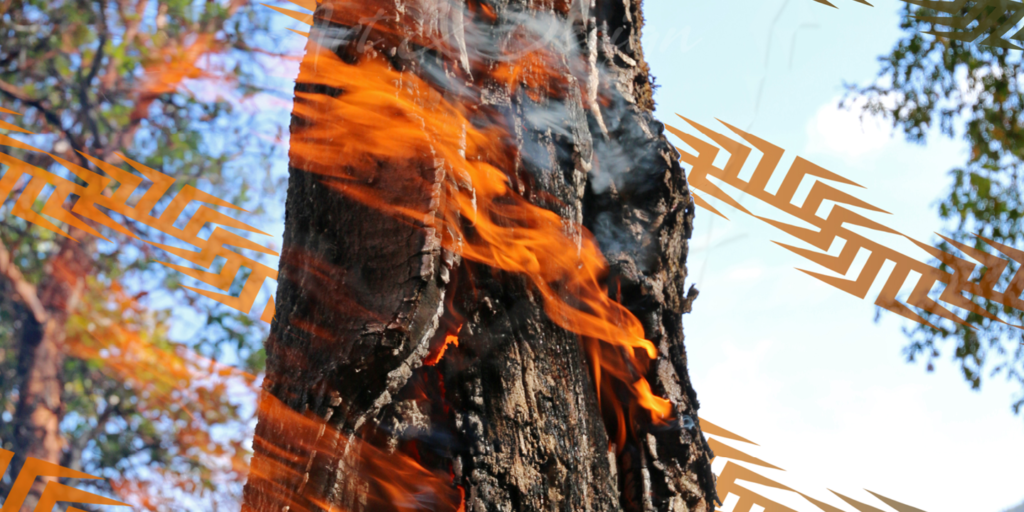Article written by Taylor Thompson (they/them, Cherokee), Food Sovereignty Program Manager, Yurok Tribe Environmental Department – tthompson@yuroktribe.nsn.us
Article edited and artwork provided by Louisa McCovey (she/her, Yurok/Hupa/Karuk), Director, Yurok Tribe Environmental Department – lomccovey@yuroktribe.nsn.us

Yurok people have maintained balance in the world through environmental stewardship in their homeland along the lower Klamath River and Pacific Coast, including parts of both Del Norte and Humboldt counties since Noohl Hee-Kon (time immemorial). The Yurok Indian Reservation only contains a fraction of the tribe’s ancestral territory, encompassing approximately 55,890 acres of land one mile on each side of the lower 46 miles of the Klamath River from just above Weitchpec and the confluence of the Trinity River to the mouth of the river as flows into the Pacific Ocean near Requa. The coastal edge of Yurok Ancestral Territory spans from the Little River drainage basin at its southern border, including Trinidad and Orick, to Damnation Creek in the north and makes up approximately 7% of California’s coastline. The inland territory extends along the Klamath River through the Bluff Creek drainage basin, includes a portion of the Trinity River, and sections of the Redwood National and State Park and the Six Rivers National Forest.
Yurok People are known as great fishermen, eelers, hunters, basket weavers, canoe makers, storytellers, singers, dancers, healers, and medicine people. They have always relied on a multitude of subsistence food offerings from the Klamath River, Pacific Coast, and inland areas. Some examples include ney-puy (salmon), kaa-ka (sturgeon), kwor-ror (candlefish), pee-ee (mussels), chey-gel’ (seaweed), woo-mehl (acorns), puuek (deer), mey-weehl (elk), ley-chehl (berries), and wey-yok-seep (teas).
Among the many pressures on traditional food systems since the arrival of European Americans, global climate change is an ever-increasing threat and form of ongoing genocide and ecocide. The Yurok Tribe is disproportionately impacted by the effects of global climate change, with droughts and catastrophic wildfires increasing in frequency, duration, and areas impacted, rising water temperatures, and factors that encourage the proliferation of invasive species and subsistence species extinction. The Yurok Tribe has long prioritized mitigating the impacts of global climate change and has taken a multi-faceted approach towards climate resiliency.
In the years 2014-2018, the Yurok Tribe created the Yurok Tribe Climate Change Adaptation Plan for Water & Aquatic Resources to identify existing vulnerabilities and provide insight for future planning, including an Aquatic Harvest Calendar that illustrates the harvest times for several traditional foods sourced from the river and coast. The Yurok Tribe Environmental Department’s Food Sovereignty Program is building on the existing Aquatic Harvest Calendar to create a Traditional Foods Calendar that incorporates harvest times for land-based foods, such as tan oak acorns, tan oak mushrooms, huckleberries, hazelnuts and many others. The establishment of this baseline data will allow the Tribe to track the impacts of climate change on traditional food sources over time. It is anticipated that shifting harvest times will have a profound cultural impact throughout the community and cause disjointed food availability for humans and other species that rely on them.
An example of direct action that the Yurok Tribe is taking to combat the impacts of global climate change is its long-standing advocacy for the reintroduction of cultural and prescribed burns. Yurok people have managed the forests with cultural fires since Noohl Hee-Kon. The Yurok Tribe’s efforts to facilitate burns, in partnership with many other agencies such as the Cultural Fire Management Council, CalFire, the US Forest Service, and other tribes, combine Yurok traditional ecological knowledge and western science methodology to demonstrate the positive impacts that fire has in mitigating the impacts of global climate change and building climate resilience. The Yurok Tribe Environmental Department is conducting a study on a parcel within the Reservation to quantify the effect of fire on the amount of wildfire fuel present, the pervasiveness of invasive plant species, the quality and quantity of traditional foods, soil quality, and water quality before and after the implementation of a cultural burn.
For Yurok people restoring fire to the landscape is a crucial step toward returning to a place of balance in the world. Alone, fire will not reverse global climate change and its devastating impacts, but it will help protect the forests of Yurok ancestral territory, the species within it, and the Yurok way of life that relies on them. Planning for the future while acting now is the only way forward to restore ecological balance.
. . . . . . . . . . . . . . . . . . . . . . . . . . . . . . . . . . .
Taylor Thompson (they/them; Cherokee) is the Food Sovereignty Program Manager of the Yurok Tribe Environmental Department.
. . . . . . . . . . . . . . . . . . . . . . . . . . . . . . . . . . .
Photographer Louisa McCovey (she/her; Yurok/Hupa/Karuk) is the Director of the Yurok Tribe Environmental Department.